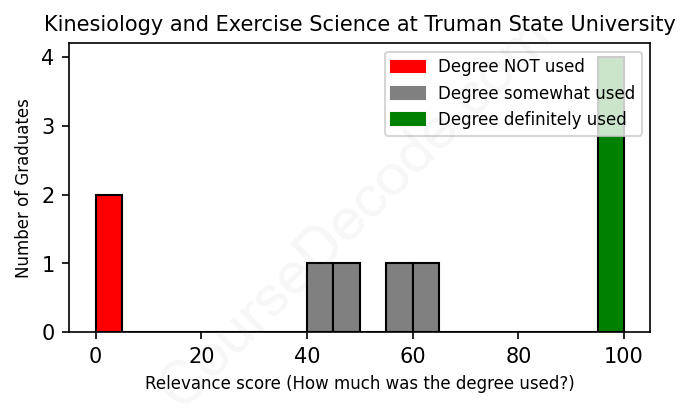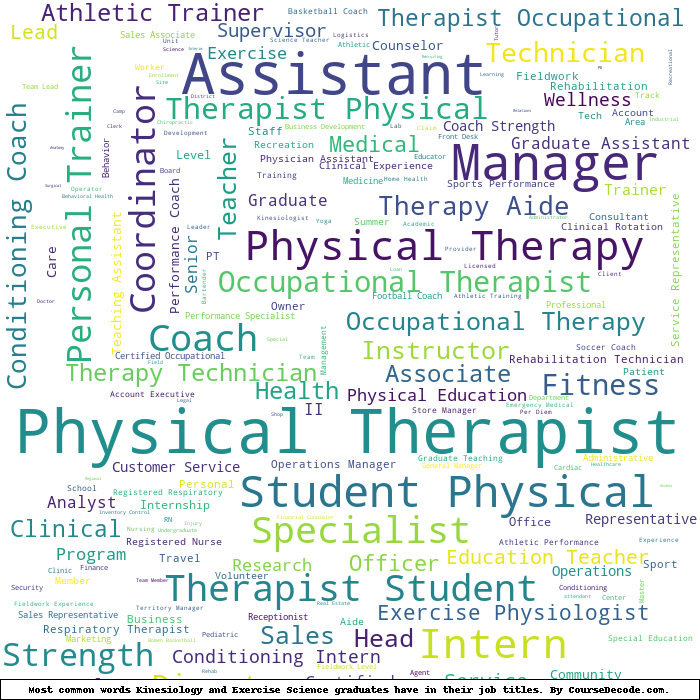
First, some facts. Of the Kinesiology and Exercise Science graduates from Truman State University we've analyzed , here's how many have used (or NOT used) their degree in their career:

These are estimates based on AI analysis of 10 LinkedIn profiles (see below).
The verdict? Below average. Overall, with an average relevance score of 60%, Kinesiology and Exercise Science graduates from Truman State University have a lower likelihood (-7%) of finding work in this field compared to the average graduate across all fields:
And for comparison, here's the chart for all profiles we've looked at across all degrees.
Also, after graduating, 40% of these graduates have pursued further education other than another Bachelor's degree (such as a Masters degree or other), compared to the average across all profiles of 35%. This suggests you may need more than just a Bachelors degree to be competitive as a Kinesiology and Exercise Science graduate.
See the details:
|
Relevance score: 0% We think this person has NOT gone into a career related to their degree. We think this person has NOT gone into a career related to their degree.
DEGREE INFOGraduated in 2011 from Truman State University with a Bachelor of Science (B.S.) in Kinesiology and Exercise Science. No other secondary education since. JOB HISTORY SINCE GRADUATIONCustomer Service Representative Veterans United Home Loans Sep 2012 - Mar 2014 Mortgage Loan Originator  Veterans United Home Loans Mar 2014 - Aug 2015 Transaction Coordinator  Veterans United Home Loans Aug 2015 - Aug 2016 Agent Relations Coordinator  Veterans United Home Loans Aug 2016 - Apr 2019 Customer Service Team Lead  Veterans United Home Loans Apr 2019 - Apr 2021 Business Analyst  Veterans United Home Loans Apr 2021 - Dec 2022 Senior Team Lead  Veterans United Home Loans Dec 2022 - Present ABOUTNo information provided. |
The top 10 most common jobs done by the graduates we've analyzed (ranked most common to least) are:
When looking at the types of jobs that graduates from Truman State University with degrees in Kinesiology and Exercise Science have ended up in, there's a mix that ranges from highly relevant positions to roles that seem pretty far off from their field of study. Many graduates have landed roles directly connected to their degree, like Physical Therapists, Personal Trainers, Strength and Conditioning Coaches, and Myofascial Trigger Point Therapists. These jobs clearly leverage the specialized knowledge they gained in anatomy, physiology, and exercise programming, which is what you would expect from a Kinesiology and Exercise Science background.
However, there’s also a significant number of alumni in positions that have little to do with their studies. Jobs in customer service, mortgage processing, and other corporate roles are common among some graduates, proving that a degree in Kinesiology doesn’t always mean you'll work in a related field. While these positions may help them develop transferable skills like communication and leadership, they don't utilize the specific expertise that comes from a Kinesiology and Exercise Science degree. Overall, while there are clear pathways into the sciences and health fields for many graduates, a good chunk has found themselves in jobs that don’t really tap into what they studied, showing the varied career paths available with this degree, both relevant and otherwise.
Here is a visual representation of the most common words in job titles for Kinesiology and Exercise Science graduates (this is across all Kinesiology and Exercise Science graduates we've analyzed, not just those who went to Truman State University):

So, when you look at the career paths of graduates from Truman State University with degrees in Kinesiology and Exercise Science, it seems like there's a bit of a mixed bag. Right after graduation, a lot of people land their first jobs in fields like personal training, therapy, or even as rehabilitation aides, which is pretty relevant to their studies. For instance, there are multiple graduates working as physical therapists or trainers almost immediately after finishing their degrees. That's good news because it shows they are able to find work aligned with their education fairly quickly.
However, five or ten years down the line, the picture starts to vary. While some individuals stay in the health and fitness realm — like personal trainers or physical therapists — others seem to branch off into completely different fields, including roles in corporate environments or the military. For example, some graduates moved into positions like logistics officer or business analyst, which don’t quite relate to Kinesiology or Exercise Science. This suggests that while many do find meaningful and relevant careers in health and fitness, others divert into different sectors, which might feel like a step away from their original career goals. Overall, it looks like the degree opens up a lot of possibilities, but the paths are not exclusively tied to Kinesiology and Exercise Science as time goes on.
Getting a Bachelor’s degree in Kinesiology and Exercise Science at Truman State University, or really anywhere, can be a bit of a mixed bag. It’s not the hardest degree out there, but you’ll definitely have to put in some effort, especially when it comes to anatomy, physiology, and exercise physiology courses. If you’re really into the subject matter and enjoy hands-on learning, that can make it more enjoyable and easier for you. Plus, there’s usually a good chunk of practical work, like labs or internships, which can balance out some of the tougher theoretical classes. Overall, it might be about average in terms of difficulty—challenging enough to keep you engaged but not so tough that you’re pulling your hair out every night!
Most commonly, in the LinkedIn profiles we've looked at, it takes people 4 years to finish a Bachelor degree in Kinesiology and Exercise Science.
Looking at these Kinesiology and Exercise Science graduates from Truman State University, it seems like there's a mixed bag when it comes to how much money they’re making. The ones in corporate roles, like those at Cerner and Oracle, likely pulled in some decent salaries as they climbed the ladder in tech, while others in more hands-on therapy jobs might not be raking in the same amount since those roles can be a bit lower-paying compared to corporate positions. The military graduate probably earned a stable salary, but the shift to a civilian role could dictate a change in pay scale. Overall, it seems some are on the path to making good money, especially in corporate or managerial positions, while others might have to hustle a bit more to see those big paychecks.
Here is a visual representation of the most common words seen in the "about" section of LinkedIn profiles who have a Bachelor degree in Kinesiology and Exercise Science (this is across all Kinesiology and Exercise Science graduates we've analyzed, not just those who went to Truman State University). This may or may not be useful:

Here are all colleges offering a Bachelor degree in Kinesiology and Exercise Science (ordered by the average relevance score of their Kinesiology and Exercise Science graduates, best to worst) where we have analyzed at least 10 of their graduates: